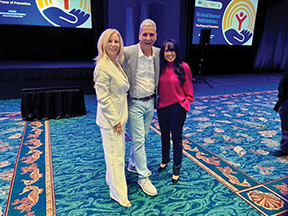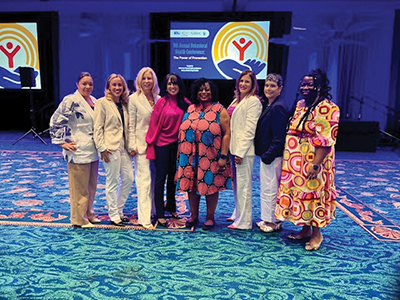By Dixie Ann Black
Roughly one thousand people each day, including healthcare professionals, policy makers, social workers, clinicians, national keynote speakers, legislators and businesses representatives converged on the Greater Fort Lauderdale Broward County Convention Center May 13th and 14th for the Ninth Annual Behavioral Health Conference.

The Power of Prevention conference was hosted by the United Way of Broward County, Commission on Behavioral Health and Drug Prevention in collaboration with Broward Behavioral Health Coalition (BBHC) and Florida Department of Children and Families. They were undergirded by several categories of sponsors, ranging from Diamond and Platinum to Scholarship Sponsors supporting the conference.
Kathleen Cannon President/CEO of the United Way of Broward County has served as its president since 2012. She describes herself as a social worker by trade, having started her career in direct services then moving into nonprofit management. She considers considers herself a “macro social worker” because she gets to work on the entire community, “layering human service and business strategy over the most complex issues of the communities.” “As social workers and non-profits we have to continue to transform, and we have to do things differently to disrupt the status quo because some things are not changing.” For example, she pointed out speaker Amanda Misiko Andere, CEO for Funders Together to End Homelessness, in the D.C. area who spoke of a framework for ending homelessness by including racial justice in the housing area as a strong element in our local communities. This conference encompassed many types of teachings for prevention, teaching clinicians and beyond how to facilitate mental health, wellness, substance abuse prevention, with the focus on having participants take this information back to their communities. Cannon reflected on strategies for the instilling of prevention by sharing these thoughts:
He had already written a suicide note.
How do we in this community instill prevention with sound strategies, build a resilient community so folks don’t need treatment, don’t escalate into mental illness or full-blown addiction? The idea is to start early, teach our clinicians and folks beyond them how to discover signs and symptoms. For example, one tract this year focuses on infants and toddlers. The first thousand days of a baby’s life has an impact on their entire future. It’s really all about building resilient communities through sound policies and teaching prevention. The opening speaker was Dr. Mimi Graham who spoke on infant mental health. She combined her research information with conversations with policy makers in the community about funding and helping families who have these needs. (This effort has so far resulted in a scheduled meeting with policy makers to consider and discuss follow-up.) This exemplifies the point of the conference, trying to solve issues happening currently while working on changing the system.
On a daily basis, mental health first aid is taught to help folks recognize in themselves, their loved ones and their community, signs of depression, hopelessness, behavior changes and more so that the local community can be a part of helping individuals who display needs. This knowledge is available through United Way’s mental health first aid training. United Way will provide this training upon request.
One mother attended the United Way of Broward’s Mental Health First Aid training. Due to the information, she learned, she realized her son was depressed. She reached out to help her son and found that he had already written a suicide note. As a result of this training, this mother still has her son today.
The Unity Way of Broward County is far reaching in its interventions. One local coalition is the Commission on Behavioral Health and Drug Prevention. It is a community coalition of 100 people who meet monthly, resulting in many task forces run by community members and staff. The interventions include the Suicide Coalition, Opioid Overdose Coalition, Anti-Vaping Coalition, teenage drinking coalition and more. This conference brings a laser focus to this community effort.
What can citizens in the community do to assist with this effort? The United Way of Broward runs a website, Drugfreebroward.org. This highly visited site provides initial information on the United Way and prevention services. Through the work of the Opioid Overdose Coalition and the community, CEO Cannon reports that the Medical Examiner’s office statistics show that there has been a 14 percent reduction of opioid deaths in Broward. This represents the first year showing a decline in opioid deaths. The coalition’s efforts have been responsible for helping to make Narcan available to prevent overdose.
Aisha T. McDonald, a licensed mental health counsellor (LMHC) and director of training initiative for the United Way of Broward oversees the mental health first aid program under a SAMHSA (Substance Abuse Mental Health Services Administration) grant. She also oversees the Crisis Intervention Team for all law enforcement in Broward County. They hold two trainings per month which teaches officers how to recognize mental health crises and how to deescalate without use of force as well as how to connect the individuals with the correct services, instead of putting them in the penal system. McDonald also oversees the Health Equity training, ‘Train The Trainer’ sponsored by UWB, Florida Blue, Moffet Cancer Center and United Health. She describes the concept of health equity as everybody having equal access to quality care. It can be as simple as the challenge of finding transportation to a health care provider. She supervises helping to train professionals to recognize these challenges. One example of success in this area is training and collaboration with Debbie’s Dream Foundation who provides healthy foods for those at risk for stomach cancer by taking into consideration not just foods but also cultural nutritional concerns.
Mental Health First Aid is CPR for addressing mental health crises. She has been in the field for over 15 years and is also a DEI consultant. McDonald points out that we are more likely to come into contact with someone who is going through a mental health crisis than a medical crisis. The mental health first aid training helps trainees to be able to talk to people with care and compassion in ways that will direct them to help. This eight-hour class is free and gives a three-year certification. Since 2019 over three thousand individuals have been trained. She stresses the importance of professionals continuing to learn so that, “When people find the courage to get help, the people providing that help are skilled and able to give appropriate care.” She points out that professionals can’t base skills only on books but be in a state of continued learning. As trends change, generations change, and methods of impacting must also be relevant to cultural groups and demographics. McDonald drives her point home with a stunning insight, “I’ve had my CPR certification for 15 years and used it three times,” she said. Then she points out that in our daily lives we are much more likely to come across someone in a mental health crisis than someone who is in need of CPR. Being trained in Mental Health First Aid will allow us to be able to offer assistance.
In addition to mental health training, and groundbreaking information at the conference, the Director of Public Relations and Marketing at the United Way of Broward County points to the support of the faith-based community. Due to their overwhelming response, a separate and additional day was added for all religions to be able to participate.
Believe in Possible.
“I’m here because of over 10,000 people who fought to keep me alive when I didn’t have the ability to fend for myself.”
The keynote speaker brought the point of the conference home. It was community and social services that saved him. Joe Roberts, fell victim to drugs starting at the age of nine and eventually found himself homeless. Faced with the sudden death of his father, the family’s resulting financial struggles, and an abusive stepfather Joe’s could have been the poster child for the very services the conference represents. He noted that based on his nosedive in mental health and resources he could well have become someone pushing a shopping cart in front of a convention center similar to the one at which he was now speaking. Roberts explains that he spent fifteen years struggling with addiction, coach surfing, homelessness. He even sold his boots for a hit of the drug his body craved. That day is etched in Roberts’ memory. He remembers standing on the corner saying to a force greater than himself. I know I’ve made mistakes, but I promise if you help me, I will help others.
He describes his situation in light of many other at-risk individuals, “Not all of it was chronic. There’s a degradation that happens, when you see somebody that’s living rough, a lot has happened. I wasn’t always visibly homeless but was most certainly at risk.” Author of “Skid row to CEO,” he describes himself as someone with lived experience who is now a philanthropist, author and impact speaker. As he steps up to give the keynote address, Roberts recognizes the fit. The attendees and speakers at the conference, community leaders, local police, social services professionals, medical, emergency, business and various other professionals, all represent the network of social workers, political and social advocates who had fought for his sobriety and success. Roberts grew up in Canada but found himself in Vancouver, being “that guy who pushed a shopping cart.” He credits his mother and the policeman who recognized his mental health need as being key to his salvation. Instead of putting him in jail, the officer took him to a treatment facility and that made all the difference. It was not immediate, nor was it a straight line but the process led him back to school. In less than twelve years he was the CEO of a multimillion-dollar company. He then started doing talks for schools, municipalities and other stakeholders. In 2019 he walked 5,625 miles in 517 days across Canada pushing a shopping cart as a symbol of homelessness. The aim was to “raise the volume as to what we can do to better protect kids before they become homeless and give them the resources they need so they can better transition to adulthood.” The walk made two million dollars but more importantly it raised awareness, engaging over 100,000 youth, and brought important stakeholders to the table as advocates. Roberts has and is still making good on his promise on that street corner.
Meanwhile Broward County has taken the bull by the horns and is seeing the result of their labors. Planning for the tenth annual conference was in the air even while this conference excited and inspired participants. It is clear that citizens of Broward and surrounding areas have a place to turn during a crisis. Anyone can start now by contacting 211 or www.unitedwaybroward.org.

